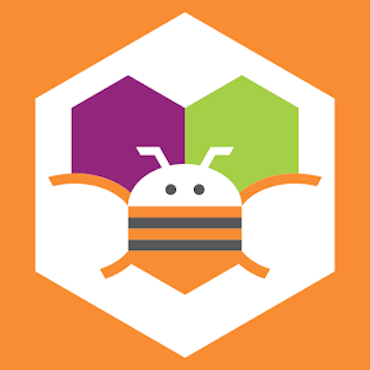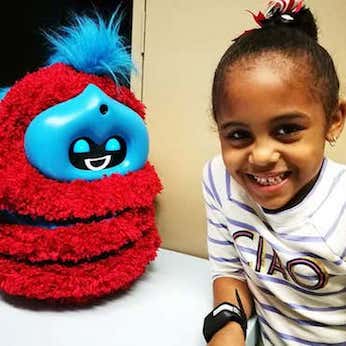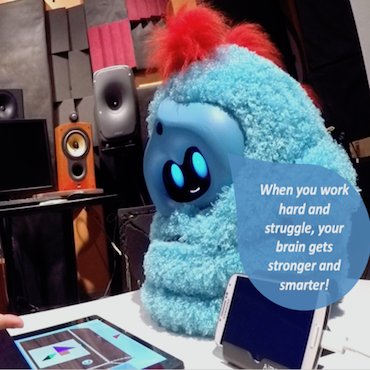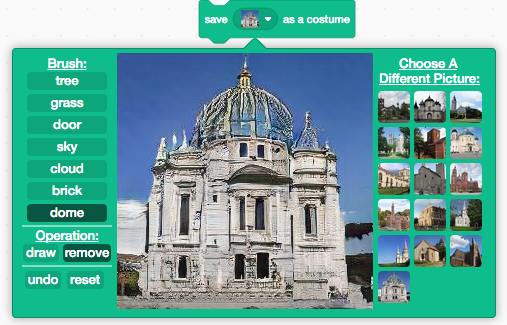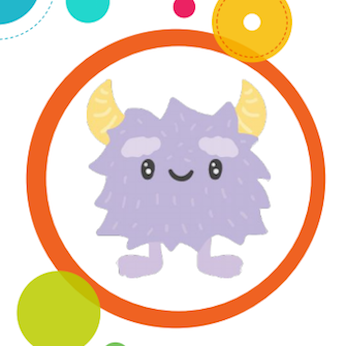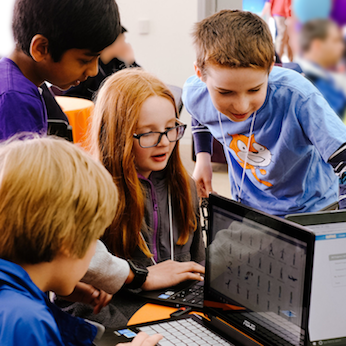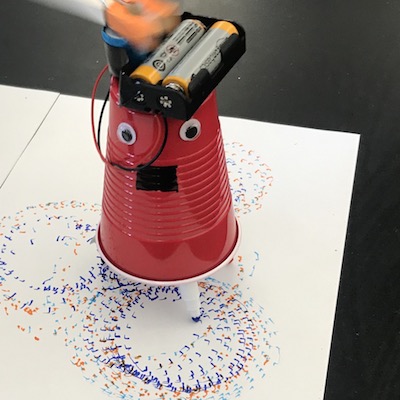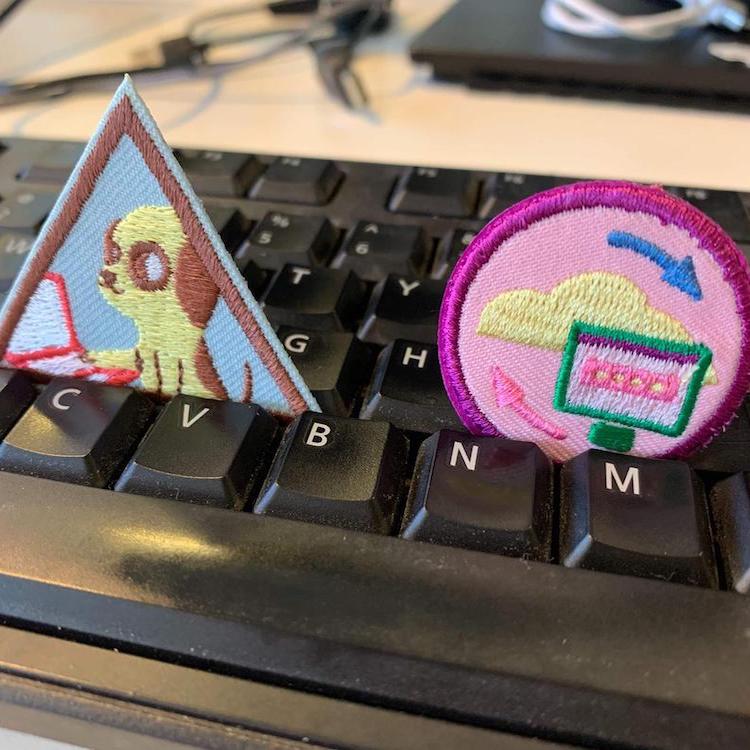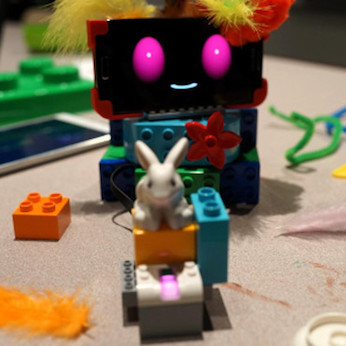Research Projects
We engage in multidisciplinary, iterative, and evidence-based research and development with a wide range of stakeholders to create new technologies, activities, practices and programs for real-world impact in homes, schools, afterschool programs and online communities. A list of publications for these projects can be found here.
Selected Publications
AI Education Peer-reviewed Research Articles and Preprints
Act Out an LLM
Supporting AI Literacy Teaching Through the Development of Assessments for Classroom Use
Initial discussion of AI literacy assessment has focused on competency frameworks and learning standards rather than materials for classroom use. Responsible AI for Computational Action (RAICA), a constructionist AI curriculum for middle and high school students, includes assessment materials to support teachers with the evaluation of student AI literacy competencies in their classrooms. These materials include exit tickets used as formative assessments at the end of each lesson and both teacher and student-facing rubrics. After beta-testing a module of the curriculum with nine teachers and 282 students, we reviewed teacher usage data and feedback as well as student responses. The review process surfaced a number of improvements to the materials to better align them with classroom teaching practice. These included clarifying language and adding visual scaffolds. We present the assessment materials and iterative design process used to bridge the gap between the theoretical AI literacy competencies and their practical implementation in classrooms.
Advancing Research on Equitable AI Education Through a Focus on Implementation: Insights from a Middle School Computer Vision Module Beta-Test
Part of a university initiative supporting responsible AI for social empowerment and education, the project-based RAICA (Responsible AI for Computational Action) curriculum supports middle/high school learners and novice AI literacy teachers use AI creatively for good. This paper offers a rare example of design-based implementation research (DBIR) in AI education across widely varied contexts, provides fine grain implementation data that contributes to a foundation for evaluating effectiveness and expanding access. We present a novel approach to analyzing fidelity of implementation data from RAICA’s computer vision module beta-test. Twelve educators working with ~282 students across nine pilot sites in four countries used a bespoke fidelity of implementation data collection tool (pre-made comment prompts in a Google Docs version of the teacher guide) to provide 236 qualitative responses about AI literacy and responsible design activities, plus 111 ordinal ratings of embedded teacher supports. Analyses revealed that while the curriculum was generally implemented as designed, educators frequently made modifications. Although most changes produced practical insights for improved curriculum design, others helped the design team anticipate and prevent changes that could obscure learning objectives and hinder outcomes. We discuss the pedagogical, design, and research implications of these findings for effective AI teaching/learning in diverse settings.
App Planner: Utilizing Generative AI in K-12 Mobile App Development Education
App Planner is an interactive support tool for K-12 students, designed to assist in creating mobile applications. By utilizing generative AI, App Planner helps students articulate the problem and solution through guided conversations via a chat-based interface. It assists them in brainstorming and formulating new ideas for applications, provides feedback on those ideas, and stimulates creative thinking. Here we report usability tests from our preliminary study with high-school students who appreciated App Planner for aiding the app design process and providing new viewpoints on human aspects especially the potential negative impact of their creation.
Exploring Prompt Engineering for Generative AI-Based App Generation
Jasmine L Shone, Robin Liu, Evan Patton, David YJ Kim. 2023.
We introduce a cutting-edge learning platform powered by large language models that enables students to effortlessly generate mobile applications for smartphones and tablets from natural language descriptions. We further demonstrate that these user-generated apps can be further optimized with minor adjustments to the generative model’s input, or, its “prompt.” To maximize the efficacy of the prompt in producing a desired application, we explore three different methods of modification: 1) altering the selection mechanism of example pairs, 2) varying the number of example pairs, and 3) changing the order of pairs within the prompt. The prompts are constructed from a collection of example pairs, which comprise a textual description of an example app and its corresponding code, in addition to a description of the desired app. We test the model’s performance by evaluating it with 18 different mobile application task descriptions, ranging from basic to complex, and then leveraging BLEU score to compare the model’s outputs to manually created apps. Our findings indicate that the method of determining example pair selection and varying the number of examples included can significantly influence the quality of the generated apps. However, reordering the placement of the example pairs within the prompt does not affect the outcome. Finally, we conclude with a discussion on the potential implications for computer science education. The platform we present in this paper aims to further the democratization of app creation through enabling users to create apps with ease, regardless of their technical background.
AI + Ethics Curricula for Middle School Youth: Lessons Learned from Three Project-Based Curricula
Randi Williams, Safinah Ali, Nisha Devasia, Daniella DiPaola, Jenna Hong, Stephen P. Kaputsos, Brian Jordan & Cynthia Breazeal. 2022.
Artificial Intelligence (AI) is revolutionizing many industries and becoming increasingly ubiquitous in everyday life. To empower children growing up with AI to navigate society’s evolving sociotechnical context, we developed three middle school AI literacy curricula: Creative AI, Dancing with AI, and How to Train Your Robot. In this paper we discuss how we leveraged three design principles—active learning, embedded ethics, and low barriers to access – to effectively engage students in learning to create and critique AI artifacts. During the summer of 2020, we recruited and trained in-service, middle school teachers from across the United States to co-instruct online workshops with students from their schools. In the workshops, a combination of hands-on unplugged and programming activities facilitated students’ understanding of AI. As students explored technical concepts in tandem with ethical ones, they developed a critical lens to better grasp how AI systems work and how they impact society. We sought to meet the specified needs of students from a range of backgrounds by minimizing the prerequisite knowledge and technology resources students needed to participate. Finally, we conclude with lessons learned and design recommendations for future AI curricula, especially for K-12 in-person and virtual learning.
Integrating Ethics and Career Futures with Technical Learning to Promote AI Literacy for Middle School Students: An Exploratory Study
Helen Zhang, Irene Lee, Safinah Ali, Daniella DiPaola, Yihong Cheng & Cynthia Breazeal. 2022.
The rapid expansion of artificial intelligence (AI) necessitates promoting AI education at the K-12 level. However, educating young learners to become AI literate citizens poses several challenges. The components of AI literacy are ill-defined and it is unclear to what extent middle school students can engage in learning about AI as a sociotechnical system with socio-political implications. In this paper we posit that students must learn three core domains of AI: technical concepts and processes, ethical and societal implications, and career futures in the AI era. This paper describes the design and implementation of the Developing AI Literacy (DAILy) workshop that aimed to integrate middle school students’ learning of the three domains. We found that after the workshop, most students developed a general understanding of AI concepts and processes (e.g., supervised learning and logic systems). More importantly, they were able to identify bias, describe ways to mitigate bias in machine learning, and start to consider how AI may impact their future lives and careers. At exit, nearly half of the students explained AI as not just a technical subject, but one that has personal, career, and societal implications. Overall, this finding suggests that the approach of incorporating ethics and career futures into AI education is age appropriate and effective for developing AI literacy among middle school students. This study contributes to the field of AI Education by presenting a model of integrating ethics into the teaching of AI that is appropriate for middle school students.
Self-efficacy and behavior patterns of learners using a real-time collaboration system developed for group programming
Ting-Chia Hsu, Hal Abelson, Evan Patton, Shih-Chu Chen & Hsuan-Ning Chang. 2022.
In order to promote the practice of co-creation, a real-time collaboration (RTC) version of the popular block-based programming (BBP) learning environment, MIT App Inventor (MAI), was proposed and implemented. RTC overcomes challenges related to non-collocated group work, thus lowering barriers to cross-region and multi-user collaborative software development. An empirical study probed into the differential impact on self-efficacy and collaborative behavior of learners in the environment depending upon their disciplinary background. The study serves as an example of the use of learning analytics to explore the frequent behavior patterns of adult learners, in this case specifically while performing BBP in MAI integrated with RTC. This study compares behavior patterns that are collaborative or individual that occurred on the platform, and investigates the effects of collaboration on learners working within the RTC depending on whether they were CS-majors or not. We highlight advantages of the new MAI design during multi-user programming in the online RTC based on the connections between the interface design and BBP as illustrated by two significant behavior patterns found in this instructional experiment. First, the multi-user programming in the RTC allowed multiple tasks to happen at the same time, which promoted engagement in joint behavior. For example, one user arranged components in the interface design while another dragged blocks to complete the program. Second, this study confirmed that the Computer Programming Self-Efficacy (CPSE) was similar for individual and multi-user programming overall. The CPSE of the homogeneous CS-major groups engaged in programming within the RTC was higher than that of the homogeneous non-CS-major groups and heterogeneous groups. There was no significant difference between the CPSE of the homogenous non-CS group and the CPSE of the heterogeneous groups, regardless of whether they were engaged in individual programming or collaborative programming within their groups. The results of the study support the value of engaging with MAI collaboratively, especially for CS-majors, and suggest directions for future work in RTC design.
The Contour to Classification game
Lee, I., & Ali, S. (2021). The Contour to Classification game. Proceedings of the 10th Symposium on Education Advances in Artificial Intelligence (EAAI ’21).
What are GANs?: Introducing Generative Adversarial Networks to Middle School Students
Ali, S., DiPaola, D., & Breazeal, C (2021). What are GANs?: Introducing Generative Adversarial Networks to Middle School Students. Proceedings of the 10th Symposium on Education Advances in Artificial Intelligence (EAAI ’21).
PoseBlocks: A Toolkit for Creating (and Dancing) with AI
Jordan, B., Devasia, N., Hong, J., Williams, R., & Breazeal, C (2021). PoseBlocks: A Toolkit for Creating (and Dancing) with AI. Proceedings of the 10th Symposium on Education Advances in Artificial Intelligence (EAAI ’21).
Teacher Perspectives on How to Train Your Robot, A Middle School AI and Ethics Curriculum
Williams, R., Kaputsos, S., & Breazeal, C (2021). Teacher Perspectives on How to Train Your Robot, A Middle School AI and Ethics Curriculum. Proceedings of the 10th Symposium on Education Advances in Artificial Intelligence (EAAI ’21).
Teaching Tech to Talk: K-12 Conversational Artificial Intelligence Literacy Curriculum and Development Tools
Jessica Van Brummelen, Tommy Heng, Viktoriya Tabunshchyk, (to appear 2021). Teaching Tech to Talk: K-12 Conversational Artificial Intelligence Literacy Curriculum and Development Tools. AAAI Symposium on Educational Advances in Artificial Intelligence (EAAI-21).
Engaging Teachers to Co-Design Integrated AI Curriculum for K-12 Classrooms
Jessica Van Brummelen, Phoebe Lin, (2020 in submission). Engaging Teachers to Co-Design Integrated AI Curriculum for K-12 Classrooms..
How to Train Your Robot: Project-Based AI Education for Middle School Classrooms
Williams, R. (2021). How to Train Your Robot: Project-Based AI Education for Middle School Classrooms. Proceedings of the 52nd ACM Technical Symposium on Computer Science Education (SIGCSE’21).
Text Classification for AI Education
Reddy, T., Williams, R., & Breazeal, C. (2021). Text Classification for AI Education. Proceedings of the 52nd ACM Technical Symposium on Computer Science Education (SIGCSE’21).
Developing Middle School Students’ AI Literacy
Lee, I., Ali, S., Zhang, H., DiPaola, D., & Breazeal, C. (2021). Developing Middle School Students’ AI Literacy. Proceedings of the 52nd ACM Technical Symposium on Computer Science Education (SIGCSE’21)
Developing Middle School Students’ AI Literacy
Lee, I., Ali, S., Zhang, H., DiPaola, D., & Breazeal, C. (2021). Developing Middle School Students’ AI Literacy. Proceedings of the 52nd ACM Technical Symposium on Computer Science Education (SIGCSE’21)
Development of an Instructional Tool for Young Children to Learn AI
Ting-Chia Hsu, Hal Abelson, Natalie Lao, Yu-Han Tseng. (2021). Behavioral-Pattern Exploration and Development of An Instructional Tool for Young Children to Learn AI. Computers and Education: Artificial Intelligence, 100012..
Behavioral-pattern exploration and development of an instructional tool for young children to learn AI
Ting-Chia Hsu, Hal Abelson, Natalie Lao, Yu-Han Tseng. (2021). Behavioral-Pattern Exploration and Development of An Instructional Tool for Young Children to Learn AI. Computers and Education: Artificial Intelligence, 100012..
Behavioral-Pattern Exploration and Development of An Instructional Tool for Young Children to Learn AI
Ting-Chia Hsu, Hal Abelson, Natalie Lao, Yu-Han Tseng, Yi-Ting Lin. Computers and Education: Artificial Intelligence.
This study aimed at developing an instructional tool for artificial intelligence education of the young students, and using learning analytics to find out the sequential learning behavioral patterns of the students during the process when they lean with the instructional tool. The instructional experiment spent 9 weeks in total. The first stage spent 5 weeks of the course involving individual learning of experiencing the first two chapters which were MIT App Inventor and Personal Image Classifier. The second stage spent 4 weeks of the course involving cooperative learning of experiencing the last two chapters which were the maker of a robot car and the competition of the computational thinking board game. At the second stage, there were two students divided into a group. Each group would make a robot car together. Finally, they played the computational thinking board game with the personal image classification application they developed by themselves at the first stage and the robot car they made by themselves at the second stage. The innovative studies found the meaningful behavioral patterns when the young students learned the application of artificial intelligence with the instructional tool developed and proposed by the study.
Can Children Emulate a Robotic Non-Player Character’s Figural Creativity?
Ali, S., Park, HW., & Breazeal, C. (2020). Can Children Emulate a Robotic Non-Player Character’s Figural Creativity?. Proceedings of the Annual Symposium on Computer-Human Interaction in Play (CHI PLAY ’20).
Escape!Bot: Child-Robot Interaction to Promote Creative Expression During Gameplay
Devasia, N., Ali, S., & Breazeal, C. (2020). Escape!Bot: Child-Robot Interaction to Promote Creative Expression During Gameplay. Extended Abstracts of the 2020 Annual Symposium on Computer-Human Interaction in Play (CHI PLAY ’20 EA).
Designing AI Learning Experiences for K-12
Xiaofei Zhou, Jessica Van Brummelen, Phoebe Lin (2020 in submission). Designing AI Learning Experiences for K-12: Emerging Works, Future Opportunities and a Design Framework..
Experiences from Teaching Actionable Machine Learning at the University Level through a Small Practicum Approach
Lao, N., Lee, I., & Abelson, H. (2020). Experiences from Teaching Actionable Machine Learning at the University Level through a Small Practicum Approach. International Conference on Computational Thinking Education 2020 (CTE2020).


